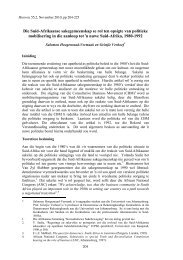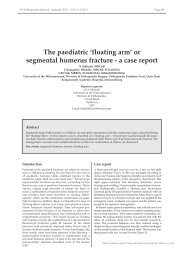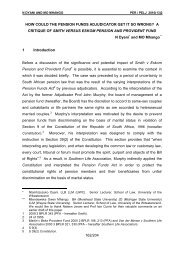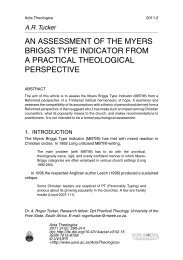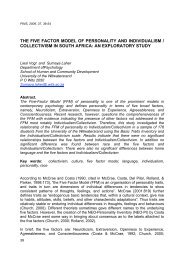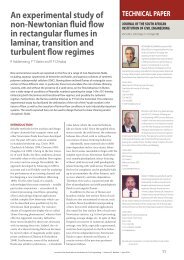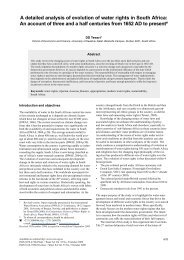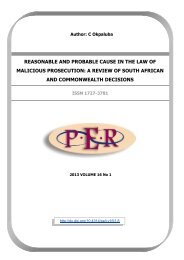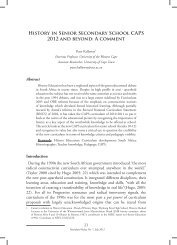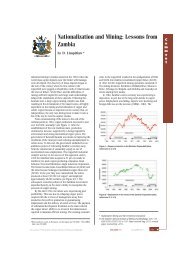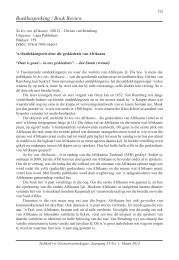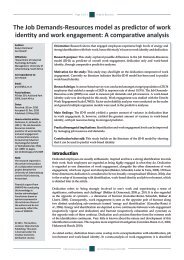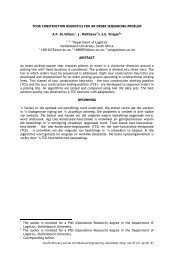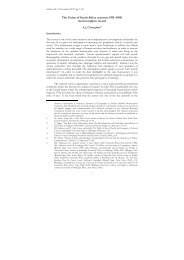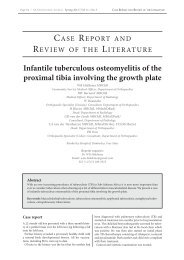91 Hendrik Verwoerd and the Leipzig School of Psychology in 1926 ...
91 Hendrik Verwoerd and the Leipzig School of Psychology in 1926 ...
91 Hendrik Verwoerd and the Leipzig School of Psychology in 1926 ...
You also want an ePaper? Increase the reach of your titles
YUMPU automatically turns print PDFs into web optimized ePapers that Google loves.
<strong>Hendrik</strong> <strong>Verwoerd</strong> <strong>and</strong> <strong>the</strong> <strong>Leipzig</strong> <strong>School</strong> <strong>of</strong> Pscyhology<br />
In <strong>in</strong>vestigat<strong>in</strong>g Moodie’s allegations regard<strong>in</strong>g <strong>the</strong> formative <strong>in</strong>fluence<br />
<strong>of</strong> German <strong>in</strong>tellectuals on Afrikaner nationalism, it makes sense to<br />
concentrate on <strong>Verwoerd</strong>’s time <strong>in</strong> <strong>Leipzig</strong> because <strong>the</strong> Psychological<br />
Institute <strong>the</strong>re is <strong>the</strong> most likely site <strong>of</strong> <strong>the</strong> alleged political <strong>in</strong>fluence from<br />
German scholars. It was <strong>the</strong> <strong>Leipzig</strong> psychologists who exhibited rightist<br />
political lean<strong>in</strong>gs, unlike <strong>the</strong>ir colleagues <strong>in</strong> Berl<strong>in</strong> <strong>and</strong> Hamburg, none <strong>of</strong><br />
whom were drawn by radical nationalism.<br />
Most overviews <strong>of</strong> <strong>the</strong> history <strong>of</strong> psychology <strong>in</strong> South Africa mention<br />
that <strong>Hendrik</strong> <strong>Verwoerd</strong> was a lecturer <strong>in</strong> psychology before enter<strong>in</strong>g politics.<br />
Besides <strong>the</strong> occasional comment however, no research on this period has<br />
been undertaken so far. 6 What we know is that <strong>Verwoerd</strong> studied<br />
psychology <strong>and</strong> philosophy at Stellenbosch <strong>and</strong> wrote a Master’s <strong>the</strong>sis <strong>in</strong><br />
each <strong>of</strong> <strong>the</strong>se subjects <strong>in</strong> 1922. From 1923 he was a lecturer <strong>in</strong> psychology<br />
at Stellenbosch. He wrote his PhD <strong>the</strong>sis, entitled “Die Afstomp<strong>in</strong>g van<br />
Gemoedsa<strong>and</strong>oen<strong>in</strong>ge” (The Blunt<strong>in</strong>g <strong>of</strong> <strong>the</strong> Emotions) based on laboratory<br />
experiments. He received his doctorate cum laude from Stellenbosch<br />
University <strong>in</strong> 1924 <strong>and</strong> was awarded a £150 Croll & Gray scholarship to<br />
study abroad. He spent three semesters <strong>in</strong> Germany (<strong>1926</strong>–27) <strong>and</strong> three<br />
months <strong>in</strong> <strong>the</strong> USA. 7 His stay <strong>in</strong> <strong>the</strong> US was cut short follow<strong>in</strong>g his<br />
appo<strong>in</strong>tment to <strong>the</strong> chair <strong>of</strong> Applied <strong>Psychology</strong> <strong>and</strong> Psychotechnics at his<br />
alma mater, Stellenbosch, from January 1928. 8<br />
6. Short notes can be found <strong>in</strong> J. Louw, “This is thy Work: A Contextual History <strong>of</strong><br />
Applied <strong>Psychology</strong> <strong>and</strong> Labour <strong>in</strong> South Africa”, PhD <strong>the</strong>sis, University <strong>of</strong><br />
Amsterdam, 1984, p 84; D. Foster, “‘Race’ <strong>and</strong> Racism <strong>in</strong> South African<br />
<strong>Psychology</strong>”, South African Journal <strong>of</strong> <strong>Psychology</strong>, 21, 19<strong>91</strong>, pp 203–210,<br />
especially p 205; <strong>and</strong> from <strong>the</strong> same author, “Critical <strong>Psychology</strong>: A Historical<br />
Overview”, <strong>in</strong> C. van Ommen <strong>and</strong> D. Pa<strong>in</strong>ter (eds), Interiors: A History <strong>of</strong><br />
<strong>Psychology</strong> <strong>in</strong> South Africa (Unisa Press, Pretoria, 2008), pp 92–122, especially p<br />
99. Little <strong>in</strong>formation on <strong>Verwoerd</strong> is provided by J.F. Pfaffe, “Die Geschichte der<br />
an Hochschulen <strong>in</strong>stitutionalisierten Psychologie <strong>in</strong> Südafrika”, Geschichte der<br />
Psychologie, No. 11, 4, 2, 1987, pp 66–77, especially p 67. The widely quoted<br />
article by R.B. Miller, “Science <strong>and</strong> Society <strong>in</strong> <strong>the</strong> Early Career <strong>of</strong> H.F. <strong>Verwoerd</strong>”,<br />
Journal <strong>of</strong> Sou<strong>the</strong>rn African Studies, 19, 4, 1993, pp 634–661, on <strong>the</strong> young<br />
<strong>Verwoerd</strong>, is mislead<strong>in</strong>g <strong>in</strong> many respects. It has proved particularly problematic<br />
because it has been used by many authors as a reference work despite Miller’s<br />
very selective <strong>and</strong> superficial perusal <strong>of</strong> <strong>the</strong> <strong>Verwoerd</strong> papers. Her allegation that<br />
<strong>Verwoerd</strong> became a nationalist out <strong>of</strong> sheer opportunism <strong>in</strong> about 1937 is not just<br />
implausible but <strong>in</strong>correct accord<strong>in</strong>g to <strong>the</strong> evidence. Scholtz’s biography <strong>of</strong><br />
<strong>Verwoerd</strong> <strong>in</strong> particular provides clear evidence that <strong>Verwoerd</strong> was already a<br />
nationalist when he was a teenager. Yet Miller completely disregards all Scholtz’s<br />
evidence on <strong>Verwoerd</strong>’s nationalism. Although Scholtz’s biography is ra<strong>the</strong>r<br />
hagiographic, it is never<strong>the</strong>less valuable because he had access to <strong>the</strong> <strong>Verwoerd</strong><br />
family archive <strong>and</strong> <strong>the</strong>refore to <strong>in</strong>formation o<strong>the</strong>r writers do not provide. See<br />
Scholtz, <strong>Verwoerd</strong>, vol. 1, chapters 1–3. See also C. Marx, “<strong>Hendrik</strong> <strong>Verwoerd</strong>’s<br />
Long March to Apar<strong>the</strong>id: Nationalism <strong>and</strong> Racism <strong>in</strong> South Africa”, <strong>in</strong> M. Berg <strong>and</strong><br />
S. Wendt (eds), Racism <strong>in</strong> <strong>the</strong> Modern World: Historical Perspectives on Cultural<br />
Transfer <strong>and</strong> Adaptation (Berghahn, New York <strong>and</strong> Oxford, 2011), pp 281–302.<br />
7. <strong>Verwoerd</strong>’s Croll Scholarship began <strong>in</strong> January <strong>1926</strong> <strong>and</strong> was valid until <strong>the</strong> end <strong>of</strong><br />
his stay overseas <strong>in</strong> January 1928. See Stellenbosch University Archives<br />
(hereafter SUA), Senate notes, p 377.<br />
8. SUA, Senate notes, meet<strong>in</strong>g <strong>of</strong> 5 December 1927, p 165; SUA, Personal file, H.F.<br />
<strong>Verwoerd</strong>, letter from Registrar to <strong>Verwoerd</strong>, 6 December 1927, tell<strong>in</strong>g him about<br />
92



